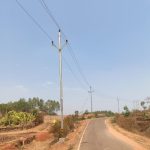New Delhi: The Supreme Court Thursday expressed its anguish over the pitiable conditions of the court rooms in lower level.
The apex court, while deliberating on the issue of dealing with the sharp rise in the number of child rape cases, pointed out that judicial officers in district and sub divisional level have to work in difficult conditions.
Senior advocate V Giri, who is assisting the court as an amicus curiae in the case titled ‘Alarming rise in the number of reported child rape incidents’, came out with his report on the reasons behind delay in investigation, prosecution and trial in cases under the POCSO.
His report dealt with stages relating to registration of cases under the POCSO Act, its investigation and trial.
Lack of adequate infrastructure and huge vacancies of judicial officers in subordinate courts is a matter of concern for the judiciary, said the Supreme Court.
“What are the ground realities in states like Tripura, Odisha and Himachal Pradesh? In states like Madhya Pradesh, they still believe in putting curtains in the court between the accused and the victim,” a bench headed by Chief Justice Ranjan Gogoi said. The bench, also comprising Justices Deepak Gupta and Aniruddha Bose, said that courtrooms in Delhi district courts like in Saket cannot be compared with those in other parts of the country.
“You may have vulnerable witness room in Saket court here but we are talking about states where we do not have these facilities. We have places where a magistrate sits in a 4 by 4 room. We have seen this and this is the reality of courts,” the bench said.
There are 5,000 vacancies of judicial officers in the country and the legislature comes out with one law after another, the bench said, adding there is a “pumping” of cases on the same judge and various law contemplates that matters should be decided within six months or one year.
The apex court said that Delhi district courts have the best of facilities but in places like in north-east and Odisha, the same facilities are not available and cases under the Protection of Children from Sexual Offences (POCSO) Act are being tried by putting curtains to follow the law which requires that the victim should not be exposed to the accused while recording of his or her statements during the trial.
“In Delhi, you have the best facility. In other parts of the country, like in north-east states, you have a curtain in the court to make separation. This is mockery of justice. We need to have requisite infrastructure for courts,” the bench said.





